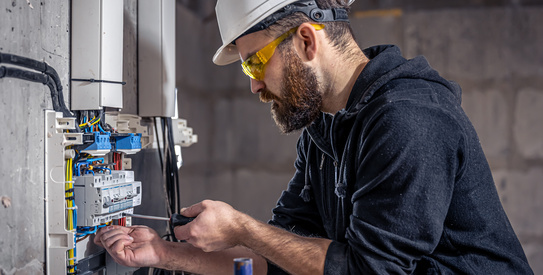
Access to the electrotechnical engineering profession
Are you thinking of starting a business as an electrician? Would you like to start a business installing lighting, home automation systems or surveillance cameras? Or are you planning to add any of these services to your existing business? In this case, you need to prove that you have the skills to start up such a business. If you don't have a diploma or experience in this field, you can obtain a certificate by sitting the central jury exam.

Which activities require electrotechnical skills?
- The installation and repair of all electrical installations for:
- Power supplies;
- Lighting;
- Illuminated signs;
- Heating;
- Air conditioning (other than those covered by access to the central heating, air conditioning, gas and sanitary installation profession);
- Home automation;
- Communication;
- Signage;
- Recording and reproduction of images or sounds;
- Protection against power surges, fire or theft.
- Repairing electrical appliances.
If in doubt, contact a Business Counter. They can advise you on your personal situation.
- The installation and repair of all electrical installations for:
Which activities are exempt?
Proof is not required for the following activities:
- The installation and repair of pipes and pipelines for the supply of electricity, without wiring or connection, if this is your business' main activity;
- The installation and repair of photovoltaic panels, if you are a business specialising in roofing and waterproofing and are not involved in the supply of electricity;
- The repair of electrical appliances whose power does not exceed 2 kilowatts, if you are a business specialising in the sale of such appliances;
- The connection of devices to a high-current installation, if you are a business specialising in the sale of such appliances, if the connection is an essential after-sales service and if it is based on an existing connection point;
- Work carried out as part of the professional activity of a refrigeration installer.
If in doubt, contact a Business Counter. They will be able to tell you whether or not you qualify for an exemption.
How can I prove my skills?
Skills can be proven in two ways:
- With an educational or training diploma;
- With 3 years' full-time or 5 years' part-time professional experience within the last 15 years.
If you don't have either, you can obtain a certificate by sitting the exam for professional skills specific to electrotechnical activities (20209) before the Central Jury.
Frequently asked questions about access to the profession
How do I know if my diploma grants me access to a profession?
A database of diplomas, degrees and certificates from all over the world helps you determine whether your qualifications meet entrepreneurial requirements. You can look up your diploma to find out which activities it gives you access to. If in doubt, contact a business counter. The Central Jury Service is not able to validate your qualifications.
Other than the company manager, who else can bring entrepreneurial skills to the business?
For a self-employed person (natural person), this person can be:
- A spouse;
- A legal cohabitant;
- A partner who has been cohabiting with the individual for at least 6 months;
- A self-employed assistant, parent or relative up to the third degree;
- An employee with a permanent employment contract.
For a business (legal entity), this person can be:
- The management body (e.g.: a manager of a limited liability company or a managing director of a public limited company);
- A company director (e.g.: an active partner in a limited liability company or a director of a public limited company);
- An employee with a permanent employment contract.
If in doubt, contact a Business Counter. They'll be able to tell you if you have the required skills for your activity.
What skills are tested on the exam? What content does the exam cover?
The exam is divided into two sections: the first covers administrative knowledge specific to the construction sector, while the second assesses your professional skills. For the first section, please refer to the syllabus provided below.
People who already have access to the profession in construction are exempt from the administrative section specific to construction. In this case, a copy of your CBE statement will be requested at registration.Section 1: Administrative knowledge specific to construction
- Registration and approval as a contractor;
- Rights and obligations of the subcontractor;
- Public procurement regulations;
- Decennial liability;
- The required insurance;
- Business contract, rights and obligations of contractor and project owner;
- Procedure and application for a building permit;
- Working drawings and specifications;
- Monitoring, inspection and acceptance of work;
- Safety regulations: General Regulation on Labour Protection, Code on Well-being at Work, safety coordination and work at a height;
- Quality policy and certification;
- Construction overheads and site risk management;
- Corroborating calculation and planning techniques;
- Reading plans;
- Environmental regulations on soil and waste;
- Environmental permit;
- Declaration of work.
Section 2: Electrotechnical skills
- Administrative knowledge:
- General regulations on electrical installations;
- Drawing up and reading plans and diagrams for electrotechnical activities;
- Safety when handling electricity;
- Concepts of rational energy consumption and quality assurance systems;
- Regulations governing safety installations.
- General knowledge:
- Materials;
- Uses and treatment;
- Cabling systems;
- Automated machines;
- Voltage regulators;
- Command modules, programmable remote controls;
- Lighting systems;
- Electric motors;
- Power generators.
- In-depth electrical knowledge:
- Direct and alternating current;
- Single-phase, two-phase and three-phase current with or without neutral;
- Ohm's law;
- Voltages, amperage, power and cosine;
- Magnetism and electromagnetism;
- DC or AC motors;
- Differential protection;
- Automated machines and switches.
- Basic knowledge:
- Electrical installation sizing
- Electric heating installations;
- Lighting systems design;
- Energy management;
- Electromagnetic compatibility;
- Harmonic, induction and overvoltage phenomena, programming and components, high-voltage installations and technical specifications (STS) for electrotechnical activities.
- The following technical knowledge:
- Laying electrical conduits;
- Drilling and fastening;
- Electrical connections;
- Adjusting electrical appliances;
- Current measurements and interpretation;
- Observing and repairing faults;
- General knowledge of Technolec's technical information notes and quality standards for electrotechnical activities.

How does the exam work?
The administrative section is a computerised multiple-choice questionnaire. The section related to the profession consists of a written exam and an oral exam before a jury.
Any questions? Any problems?
info.jurycentral.dgo6@spw.wallonie.be
Office hours:
Monday: 2 – 4pm
Tuesday: 2 – 4pm
Wednesday: 9am – 12pm
Friday: 9am – 12pm081/33.40.00
Our offices are located at:
Boulevard Cauchy 43
5000 NAMUR
Are you looking for other solutions for your project?

Receive personalised advice and quickly find the answers to your questions. Find the help you need on 1890.be.
Discover other solutionsOther state aid

Innovation, training, exports, consultancy... Take a look at all the state aid available to Walloon companies.
To the Midas database